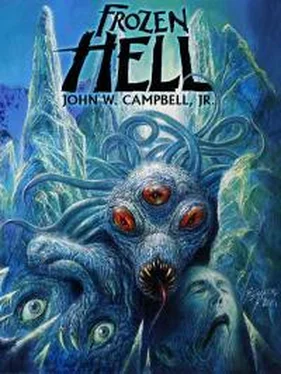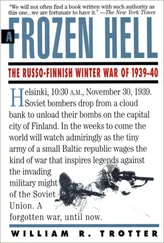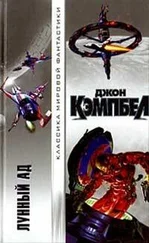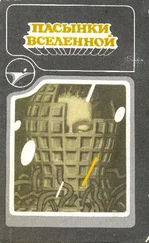Джон Кэмпбелл - Frozen Hell
Здесь есть возможность читать онлайн «Джон Кэмпбелл - Frozen Hell» весь текст электронной книги совершенно бесплатно (целиком полную версию без сокращений). В некоторых случаях можно слушать аудио, скачать через торрент в формате fb2 и присутствует краткое содержание. Год выпуска: 2019, Издательство: Wildside Press, Жанр: Фантастика и фэнтези, на английском языке. Описание произведения, (предисловие) а так же отзывы посетителей доступны на портале библиотеки ЛибКат.
- Название:Frozen Hell
- Автор:
- Издательство:Wildside Press
- Жанр:
- Год:2019
- ISBN:нет данных
- Рейтинг книги:3 / 5. Голосов: 1
-
Избранное:Добавить в избранное
- Отзывы:
-
Ваша оценка:
- 60
- 1
- 2
- 3
- 4
- 5
Frozen Hell: краткое содержание, описание и аннотация
Предлагаем к чтению аннотацию, описание, краткое содержание или предисловие (зависит от того, что написал сам автор книги «Frozen Hell»). Если вы не нашли необходимую информацию о книге — напишите в комментариях, мы постараемся отыскать её.
Frozen Hell — читать онлайн бесплатно полную книгу (весь текст) целиком
Ниже представлен текст книги, разбитый по страницам. Система сохранения места последней прочитанной страницы, позволяет с удобством читать онлайн бесплатно книгу «Frozen Hell», без необходимости каждый раз заново искать на чём Вы остановились. Поставьте закладку, и сможете в любой момент перейти на страницу, на которой закончили чтение.
Интервал:
Закладка:
“That,” McReady pronounced, “is wrong. It’s been dead too long, and it isn’t natural. Not to this planet, anyway. You can lay money on it—even the entire camp’s poker-gambling capital, the entire, famous $42.23, that Scarecrow isn’t going to be popular until you’ve got him nicely dissected and pickled in formaldehyde. If then.”
The Big Magnet party washed up around them, the physics and mechanics departments gravitating naturally with Vane and Norris and Barclay to the tractor, examining the fused dynamo and radio equipment. The group spread out, trickling back to the wrapped, crude cylinder on the rearmost sledge. Commander Garry stood with Blair and Dr. Copper discussing the Thing, planning what to do with it. Vane and Norris drifted over, to add information about the immolation of the strange ship.
The sledges began to move apart, goods piled from Blair’s sledge onto the larger first trailer. McReady came back to learn what decisions had been made.
“I understand Connant is watchman tonight,” he said and smiled. “His interest in cosmic rays hold up after you mentioned your little plan, Blair?”
Commander Garry chuckled. “I can’t say I blame him too much, but he doesn’t seem enthusiastic. We’ve heard stories about this fellow. It sounds like Jerry’s in for an unpleasant evening.”
“Wait ’til you see him.” McReady promised. There was no smile on his face. “The cosmic ray hut is small, and Jerry Connant is going to wish for more separation before this evening’s over.”
“All set!” Barclay’s voice rang out. “Clear out.”
The group around the tractor moved back. There was a shower of hissing, glowing coals from the fire box. A cloud of dirty steam rose up about the machine. Then a moment later, the shrill whistle of the boiler water driving out of the boiler drain-cock under the pressure of the steam. Clouds of ice-smoke rolled off slowly in the direction of the camp, slowing as the whistle changed to a scream as the last of the water jetted out, and steam thrust from the drain. The roar died away; hot metal began to tink with contraction. Cold was taking hold of the tractor.
McReady walked back toward the Administration Building beside Powell, the Expedition’s senior meteorologist. “That wind there rather saved you when the ship started going, then?”
McReady nodded. “No rather about it; it did. Hundred’s of tons of magnesium metal. Only the fact that ice is opaque to heat rays, that we were on the far side of a solid rock ridge, and that bitter, steady wind saved us.”
“It seems to me you’d have been able, somehow, to recognize magnesium metal,” Powell said hesitantly. “I—now I don’t mean that you slipped; what I mean is—why was it impossible to recognize the difference?”
“We couldn’t lift it, so we had no idea of specific gravity. It was harder than our tools, so we couldn’t get a sample. It was an utterly unknown alloy of an alien race. And they’d rendered it passive somehow. Maybe there was a coat of chromium plate. Anyway, it didn’t react with alphuric acid, and that suggested an inactive, not a voraciously active metal. We didn’t go out there with analytical equipment; the simple acid test we made was Barclay’s idea, and he used ordinary storage battery acid. God, that alloy alone would have been worth a fortune to us! It alone would have financed this expedition. And what unguessable secrets of lifting and propulsion we lost in that fire—well, it was a tragedy as great as any in history. It would have remade all Earth’s history if we had been able to enter and examine that ship.”
Powell nodded thoughtfully. “You had us worried for a while. We saw that enormous flame, and saw the aurora bend down, of course. The magnetic instruments detected the thing, but we didn’t realize that at first—they were recording. Dutton was calling at the transmitter there for an hour, with the whole camp hanging over his shoulder, sitting there absolutely still. Not a sound but the wash of static.
“‘There’s no schedule,’ Dutton said.
“‘Don’t be an ass,’ Connant snapped at him. ‘They wouldn’t wait for schedule to report a thing like that. They’re more apt to have been in that, whatever it was.’
“We hadn’t any idea then about the magnetic explosion. That was Tolman’s idea.
“‘That strange ship was the magnet,’ he said suddenly, ‘and I’ll bet that ship was what blew up out there. We can’t fly until the sun’s up, or we hear from them that they’ve lighted the field. If the ship blew up, the magnetic force would be released—’ and Tolman dived for the recorders. It was there, of course—two of the pens jammed clear off the paper, and trying to get back on, the vertical, component recorder still tracing out a diminishing sine wave.
“Tolman looked at the Thing, then called over to Dutton, ‘You may as well quit that, because they can’t hear you, and they sure as hell can’t transmit. That ship blew up, and it released all the magnetic force. Every coil within ten miles of the thing that was capable of acting as an inductance is fused rubbish. Their dynamo, transformers, inductances, probably even condensers are all shot. They might be alive. We’ll have to fly tomorrow.’
“So Commander Garry sent the ’gyro when the sun came up, and brought back Dr. Copper. But it was an unpleasant twelve hours of waiting.”
McReady nodded. “We knew it must be, but there wasn’t a thing we could do. I thought of sending up a sounding balloon with a candle on it in hopes you’d see and know we were alive, but realized it was too small. We got some of your later calls, as you know, because Barclay patched up a receiver out of spares, junk, and will power. But the secondary magnet’s gone. And the chance of learning the secrets of a more ancient, alien race gone with it. The magnetic men are through out there, through forever, but I think we might try to organize an expedition in that direction. The winds are unique, to put it gently.”
Powell chuckled. “Dr. Copper said something about it being coolish.”
“I never saw a 35-mile wind with a temperature of -50° or below before. It’s more or less of an axiom that high winds bring high temperatures—air friction warms them if nothing else. But even that didn’t work out there. I think that in all the ages that beast was frozen there, the temperature never rose above freezing; it was chilled by winds straight from the Polar Plateau.”
They reached the outlying shack of the meteorologists and ducked into it together. McReady threw his things on his bunk and glanced automatically at the recording instruments set in the wall. He grinned, nodded toward them, and chuckled.
“Man, those little lines look funny. That wind velocity—wait ’til you see the cards we brought back. Let’s go on over to the Ad Building.”
Comparatively mild as it was here at Big Magnet, the weather was not that of a Temperate Zone spring day. They started down the communication tunnel, the combined storeroom and passageway under the surface. Crates and boxes formed its walls, some empty, some still full. Gasoline and canned food, instrument cards, and best boot-grease. Tooth brushes and dehydrated carrots, canned beer, and spare parts for recording hygrometers. Crates, boxes, and snow blocks. The roofing was a strip of waterproof paper over chicken wire laid on wooden slats. The inevitable antarctic drift covered it in a thick blanket. And the wire, the slats, and the crates were coated with magnificent ice-jewels that sparkled in the light of McReady’s pressure lamp; ice crystals, perfect flat hexagons, some of them two inches across, all similar yet none identical.
The packed snow floor rose and fell irregularly. Ahead, the Ad Building door opened momentarily and closed again. The others were streaming into camp. Other corridors under the snow joined theirs; they passed the entrance to the Radio building, and the tunnel strung with insulated cables that lead off in majestic isolation to the power plant nearly a quarter of a mile away. Another quarter of a mile in the opposite direction lay the magnetic observatory.
Читать дальшеИнтервал:
Закладка:
Похожие книги на «Frozen Hell»
Представляем Вашему вниманию похожие книги на «Frozen Hell» списком для выбора. Мы отобрали схожую по названию и смыслу литературу в надежде предоставить читателям больше вариантов отыскать новые, интересные, ещё непрочитанные произведения.
Обсуждение, отзывы о книге «Frozen Hell» и просто собственные мнения читателей. Оставьте ваши комментарии, напишите, что Вы думаете о произведении, его смысле или главных героях. Укажите что конкретно понравилось, а что нет, и почему Вы так считаете.


![Джон Кэмпбелл - Из мрака ночи [Сборник]](/books/28063/dzhon-kempbell-iz-mraka-nochi-sbornik-thumb.webp)







![Джон Кэмпбелл - Острова в космосе [litres с оптимизированной обложкой]](/books/433450/dzhon-kempbell-ostrova-v-kosmose-litres-s-optimizi-thumb.webp)